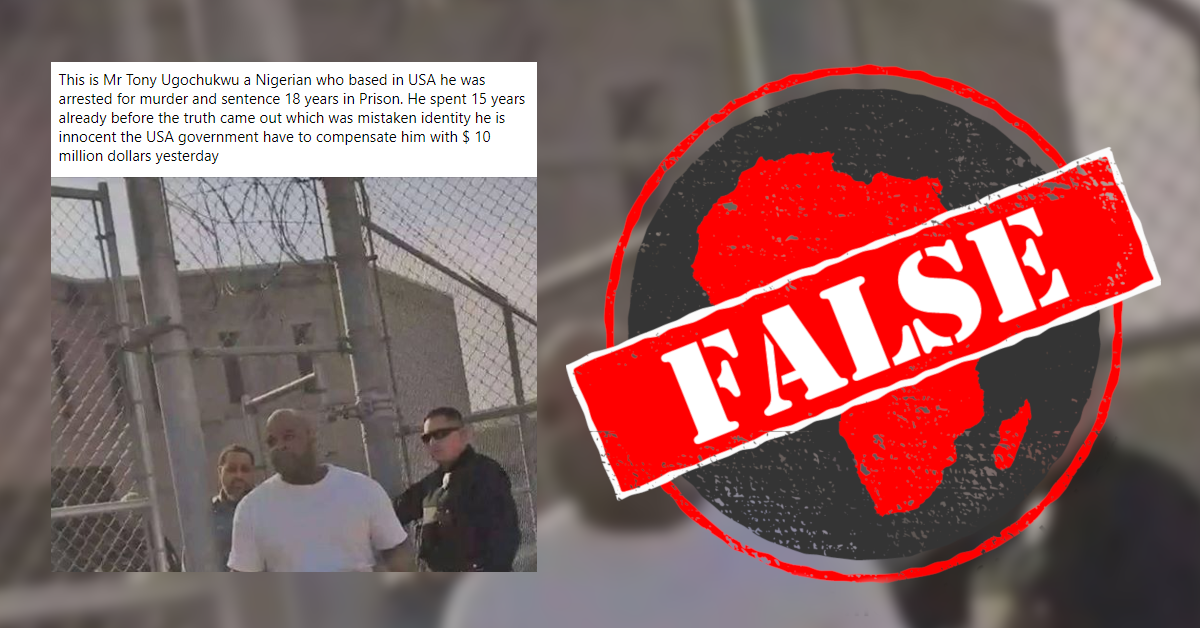An innocent Nigerian has been released from a United States prison after serving 15 years for a crime he didn’t commit. This is according to a Facebook post from 22 May 2020 that claims to show a photo of “Mr Tony Ugochukwu” walking out of jail.
The photo has also been posted on the Nigerian forum Nairaland.
Who is the man in the photo, and what is his story?

A reverse image search reveals that the man is not Nigerian. He is Elmer Daniels from the US state of Delaware. The photo is of him leaving a correctional facility on 13 December 2018. In a video by a local news channel, Daniels is wearing in the same white T-shirt and khaki trousers as shown in the photo.
Daniels was released from prison, but not after serving 15 years of an 18-year murder charge, as the Facebook post claims.
In 1980, at the age of 18, he was sentenced to life imprisonment for sexual abuse. Evidence that helped convict him was later found to have been faulty. He was exonerated after he had spent nearly 40 years inside.
The Facebook post also claims the man was awarded US$10 million in compensation for his wrongful imprisonment. There’s a grain of truth in that.
Sean Lynn, a US lawmaker, proposed a bill in June 2019 that would compensate Daniels and other Delaware residents found innocent after wrongful convictions. Lynn claims that his bill was inspired by a meeting with Daniels.
The bill has not yet become law. Voting on it has been delayed by the Covid-19 pandemic. If it does become law, the bill would pay the wrongfully incarcerated $50,000 “per year of incarceration”. In Daniels’s case, he would receive just under $2 million in compensation. – Keegan Leech
The photo has also been posted on the Nigerian forum Nairaland.
Who is the man in the photo, and what is his story?

Meet Elmer Daniels
A reverse image search reveals that the man is not Nigerian. He is Elmer Daniels from the US state of Delaware. The photo is of him leaving a correctional facility on 13 December 2018. In a video by a local news channel, Daniels is wearing in the same white T-shirt and khaki trousers as shown in the photo.
Daniels was released from prison, but not after serving 15 years of an 18-year murder charge, as the Facebook post claims.
In 1980, at the age of 18, he was sentenced to life imprisonment for sexual abuse. Evidence that helped convict him was later found to have been faulty. He was exonerated after he had spent nearly 40 years inside.
Compensation for wrongful conviction
The Facebook post also claims the man was awarded US$10 million in compensation for his wrongful imprisonment. There’s a grain of truth in that.
Sean Lynn, a US lawmaker, proposed a bill in June 2019 that would compensate Daniels and other Delaware residents found innocent after wrongful convictions. Lynn claims that his bill was inspired by a meeting with Daniels.
The bill has not yet become law. Voting on it has been delayed by the Covid-19 pandemic. If it does become law, the bill would pay the wrongfully incarcerated $50,000 “per year of incarceration”. In Daniels’s case, he would receive just under $2 million in compensation. – Keegan Leech
Republish our content for free
For publishers: what to do if your post is rated false
A fact-checker has rated your Facebook or Instagram post as “false”, “altered”, “partly false” or “missing context”. This could have serious consequences. What do you do?
Click on our guide for the steps you should follow.
Publishers guideAfrica Check teams up with Facebook
Africa Check is a partner in Meta's third-party fact-checking programme to help stop the spread of false information on social media.
The content we rate as “false” will be downgraded on Facebook and Instagram. This means fewer people will see it.
You can also help identify false information on Facebook. This guide explains how.


Add new comment